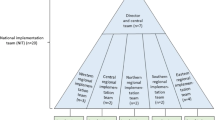Abstract
This report describes three studies from the nationwide Norwegian implementation of Parent Management Training—Oregon Model (PMTO™), an empirically supported treatment for families of children with behavior problems (Forgatch and Patterson 2010). Separate stages of the implementation were evaluated using a fidelity measure based on direct observation of intervention sessions. Study 1 assessed growth in fidelity observed early, mid, and late in the training of a group of practitioners. We hypothesized increased fidelity and decreased variability in practice. Study 2 evaluated method fidelity over the course of three generations of practitioners trained in PMTO. Generation 1 (G1) was trained by the PMTO developer/purveyors; Generation 2 (G2) was trained by selected G1 Norwegian trainers; and Generation 3 (G3) was trained by G1 and G2 trainers. We hypothesized decrease in fidelity with each generation. Study 3 tested the predictive validity of fidelity in a cross-cultural replication, hypothesizing that higher fidelity scores would correlate with improved parenting practices observed in parent–child interactions before and after treatment. In Study 1, trainees’ performance improved and became more homogeneous as predicted. In Study 2, a small decline in fidelity followed the transfer from the purveyor trainers to Norwegian trainers in G2, but G3 scores were equivalent to those attained by G1. Thus, the hypothesis was not fully supported. Finally, the FIMP validity model replicated; PMTO fidelity significantly contributed to improvements in parenting practices from pre- to post-treatment. The data indicate that PMTO was transferred successfully to Norwegian implementation with sustained fidelity and cross-cultural generalization.

Similar content being viewed by others
References
Arthur, M. W., Hawkins, J. D., Pollard, J. A., Catalano, R. F., & Baglioni, A. J., Jr. (2002). Measuring risk and protective factors for substance use, delinquency, and other adolescent problem behaviors: The Communities That Care Youth Survey. Evaluation Review, 26, 575–601.
Bagner, D. M., & Eyberg, S. M. (2003). Father involvement in parent training: When does it matter? Journal of Clinical Child and Adolescent Psychology, 32, 599–605.
Beauchaine, T. P., Webster-Stratton, C., & Reid, M. J. (2005). Mediators, moderators, and predictors of 1-year outcomes among children treated for early-onset conduct problems: A latent growth curve analysis. Journal of Consulting and Clinical Psychology, 73, 371–388.
Bernal, G., Bonilla, J., & Bellido, J. (1995). Ecological validity and cultural sensitivity for outcome research: Issues for the cultural adaptation and development of psychosocial treatments with Hispanics. Journal of Abnormal Child Psychology, 23, 67–82.
Björnsdóttir, A., & Simarsdóttir, M. (2009). Parent Management Training—The Oregon Model (PMTO™): Effect of a prevention and treatment program for behavioral problems among kindergarten and elementary school children in Hafnarfjördur. Icelandic Journal of Education, 18, 9–28.
Brown, H. C., Wang, W., Kellam, S. G., Muthén, B. O., Petras, H., Toyinbo, P., et al. (2008). Methods for testing theory and evaluating impact in randomized field trials: Intent-to-treat analyses for integrating the perspectives of person, place, and time. Drug and Alcohol Dependence, 95, S74–S104.
Bullard, L., Wachlarowicz, M., DeLeeuw, J., Snyder, J., Low, S., Forgatch, M. S., et al. (2010). Effects of the Oregon Model of Parent Management Training (PMTO) on marital adjustment in new stepfamilies: A randomized trial. Journal of Family Psychology, 24, 485–496.
Chamberlain, P., Davis, B., Forgatch, M. S., Frey, S., Patterson, G. R., Ray, J. R., et al. (1986). The Therapy Process Code: An observational system. Eugene: Oregon Social Learning Center.
Clarke, P. (2008). When can group level clustering be ignored? Multilevel models versus single-level models with sparse data. Journal of Epidemiological Community Health, 62, 752–758.
DeGarmo, D. S., & Forgatch, M. S. (2007). Efficacy of parent training for stepfathers: From playful spectator and polite stranger to effective stepfathering. Parenting: Science and Practice, 7, 1–25.
DeGarmo, D. S., Patterson, G. R., & Forgatch, M. S. (2004). How do outcomes in a specified parent training intervention maintain or wane over time? Prevention Science, 5, 73–89.
Domenech Rodríguez, M. M., Baumann, A. A., & Schwartz, A. L. (2011). Cultural adaptation of an evidence based intervention: From theory to practice in a Latino/a community context. American Journal of Community Psychology, 47, 170–186.
Dumas, J. E., Lynch, A. M., Laughlin, J. E., Smith, E. P., & Prinz, R. J. (2001). Promoting intervention fidelity: Conceptual issues, methods, and preliminary results from the EARLY ALLIANCE prevention trial. American Journal of Preventive Medicine, 20, 38–47.
Eames, C. (2008). The Leader Observation Tool: A process skills treatment fidelity measure for the Incredible Years parenting programme. Child Care, Health and Development, 34, 391–400.
Eddy, J. M., & Chamberlain, P. (2000). Family management and deviant peer association as mediators of the impact of treatment condition on youth antisocial behavior. Journal of Consulting and Clinical Psychology, 68, 857–863.
Fixsen, D. L., Naoom, S. F., Blase, K. A., Friedman, R. M., & Wallace, F. (2005). Implementation research: A synthesis of the literature. Tampa: University of South Florida, Louis de la Parte Florida Mental Health Institute, National Implementation Research Network.
Fixsen, D. L., Naoom, S. F., Blase, K. A., & Wallace, F. (2007). Implementation: The missing link between research and practice. The APSAC Advisor, Winter/Spring, 4–11.
Follette, W. C., & Beitz, K. (2003). Adding a more rigorous scientific agenda to the empirically supported treatment movement. Behavior Modification, 27, 369–386.
Forgatch, M. S., Principal Investigator. (2002–2007). Implementing parent management training in Norway (Grant No. R0116097). NIDA NNPRI: Community Multi-Site Prevention Trials (CMPT). Eugene: Oregon Social Learning Center.
Forgatch, M. S., & DeGarmo, D. S. (1999). Parenting through change: An effective prevention program for single mothers. Journal of Consulting and Clinical Psychology, 67, 711–724.
Forgatch, M. S., & Patterson, G. R. (2010). Parent management training—Oregon model: An intervention for antisocial behavior in children and adolescents. In J. R. Weisz & A. E. Kazdin (Eds.), Evidence-based psychotherapies for children and adolescents (2nd ed., pp. 159–178). New York: Guilford.
Forgatch, M. S., Knutson, N. M., & Mayne, T. (1992). Coder impressions of ODS lab tasks. Eugene: Oregon Social Learning Center.
Forgatch, M. S., DeGarmo, D. S., & Beldavs, Z. (2005a). An efficacious theory-based intervention for stepfamilies. Behavior Therapy, 36, 357–365.
Forgatch, M. S., Patterson, G. R., & DeGarmo, D. S. (2005b). Evaluating fidelity: Predictive validity for a measure of competent adherence to the Oregon model of parent management training (PMTO). Behavior Therapy, 36, 3–13.
Forgatch, M. S., Patterson, G. R., DeGarmo, D. S., & Beldavs, Z. G. (2009). Testing the Oregon delinquency model with nine-year follow-up of the Oregon Divorce Study. Development and Psychopathology, 21, 637–660.
Glisson, C. (2007). Assessing and changing organizational culture and climate for effective services. Research on Social Work Practice, 17, 736–747.
Herschell, A. D., McNeil, C. B., & McNeil, D. W. (2004). Clinical child psychology’s progress in disseminating empirically supported treatments. Clinical Psychology: Science and Practice, 11, 267–288.
Hogue, A., Liddle, H. A., Singer, A., & Leckrone, J. (2005). Intervention fidelity in family-based prevention counseling for adolescent problem behaviors. Journal of Community Psychology, 33, 191–211.
Jeličić, H., Phelps, E., & Lerner, R. M. (2009). Use of missing data methods in longitudinal studies: The persistence of bad practices in developmental psychology. Developmental Psychobiology, 45, 1195–1199.
Knutson, N. M., Forgatch, M. S., Rains, L. A., & Sigmarsdóttir, M. (2009). Fidelity of Implementation Rating System (FIMP): The manual for PMTO™ (Revised ed.). Eugene, OR: Implementation Sciences International, Inc.
McHugh, R. K., & Barlow, D. H. (2010). The dissemination and implementation of evidence-based psychological treatments: A review of current efforts. American Psychologist, 65, 73–84.
Muthén, L. K., & Muthén, B. O. (2010). MPlus: Statistical analysis with latent variables user’s guide (6th ed.). Los Angeles, CA: StatModel.
Ogden, T., & Amlund-Hagen, K. (2008). Treatment effectiveness of parent management training in Norway: A randomized controlled trial of children with conduct problems. Journal of Consulting and Clinical Psychology, 76, 607–621.
Ogden, T., Forgatch, M. S., Askeland, E., Patterson, G. R., & Bullock, B. M. (2005). Implementation of parent management training at the national level: The case of Norway. Journal of Social Work Practice, 19, 317–329.
Patterson, G. R., Reid, J. B., & Dishion, T. J. (1992). Antisocial boys (Vol. 4). Eugene, OR: Castalia.
Perepletchikova, F., Treat, T. A., & Kazdin, A. E. (2007). Treatment integrity in psychotherapy research: Analysis of the studies and examination of the associated factors. Journal of Consulting and Clinical Psychology, 75, 829–841.
Price, R. H. (2000, December). Mobilization, reinvention, and scaling up: Three core processes in knowledge exchange, adaptation, and implementation. Paper presented at the Inaugural World Conference, “The Promotion of Mental Health and Prevention of Mental and Behavioral Disorders,” Atlanta, GA.
Reid, J. B., Fleischman, M. J., Arthur, J., Toobert, D. J., Stern, S., & Patterson, G. R. (1979, December). Therapist performance observational system. Paper presented at the Association for the Advancement of Behavior Therapy, San Francisco.
Reid, J. B., Patterson, G. R., & Snyder, J. (2002). Antisocial behavior in children and adolescents: A developmental analysis and model for intervention. Washington, DC: American Psychological Association.
Rogers, E. M. (1995). Diffusion of innovations (4th ed.). New York: Free Press.
Rohrbach, L. (2006). Type II translation: Transporting prevention interventions from research to real-world settings. Evaluation & the Health Professions, 29, 302–333.
Salas, E., & Cannon-Bowers, J. A. (2001). The science of training: A decade of progress. Annual Review of Psychology, 52, 471–499.
Stevens, V., Bourdeaudhuij, I. D., & Oost, P. V. (2001). Anti-bullying interventions at school: Aspects of programme adaptation and critical issues for further programme development. Health Promotion International, 16, 155–167.
Stoolmiller, M., & Bank, L. (1995). Autoregressive effects in structural equation models: We see some problems. In J. M. Gottman & G. Sackett (Eds.), The analysis of change (pp. 263–276). Hillsdale, NJ: Erlbaum.
Stoolmiller, M., Duncan, T. E., Bank, L., & Patterson, G. R. (1993). Some problems and solutions in the study of change: Significant patterns of client resistance. Journal of Consulting and Clinical Psychology, 61, 920–928.
Stubbs, J., Crosby, L., Forgatch, M. S., & Capaldi, D. M. (1998). Family and peer process code: A synthesis of three Oregon Social Learning Center behavior codes. (Training manual.) Available at www.oslc.org/resources/codemanuals/familypeerprocesscode.pdf.
Tremblay, R. E., Pagani-Kurtz, L., Mâsse, L. C., Vitaro, F., & Pihl, R. O. (1995). A bimodal preventive intervention for disruptive kindergarten boys: Its impact through mid-adolescence. Journal of Consulting and Clinical Psychology, 63, 560–568.
Waller, G. (2009). Evidence-based treatment and therapist drift. Behaviour Research and Therapy, 47, 119–127.
Waltz, J., Addis, M. E., Koerner, K., & Jacobson, N. S. (1993). Testing the integrity of a psychotherapy protocol: Assessment of adherence and competence. Journal of Consulting and Clinical Psychology, 61, 620–630.
Author information
Authors and Affiliations
Corresponding author
Additional information
The project described was supported by Award Number R01DA 16097 from the Prevention Research Branch, NIDA, U.S. PHS; and Award Number P30 DA023920 from the Division of Epidemiology, Services and Prevention Research, Prevention Research Branch, NIDA, U.S. PHS. The content is solely the responsibility of the authors and does not necessarily represent the official views of NIDA.
Rights and permissions
About this article
Cite this article
Forgatch, M.S., DeGarmo, D.S. Sustaining Fidelity Following the Nationwide PMTO™ Implementation in Norway. Prev Sci 12, 235–246 (2011). https://doi.org/10.1007/s11121-011-0225-6
Published:
Issue Date:
DOI: https://doi.org/10.1007/s11121-011-0225-6



